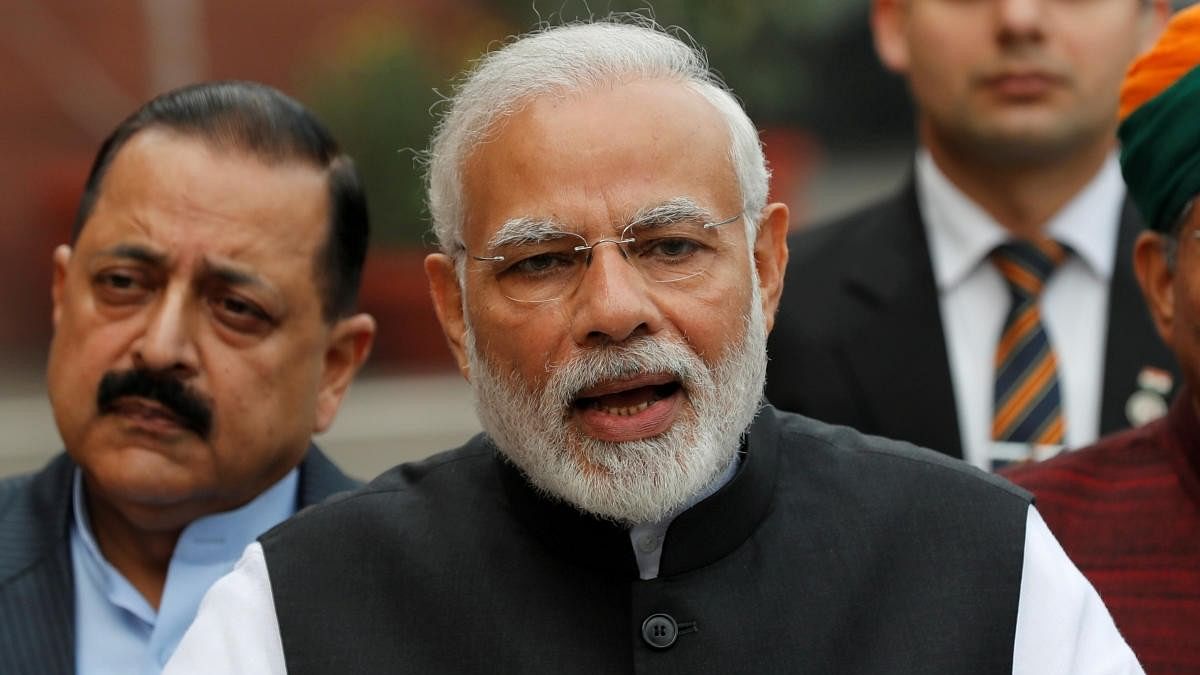
Prime Minister Narendra Modi speaks with the media outside Parliament on the first day of the winter session, in New Delhi.
Credit: Reuters File Photo
Will Prime Minister Narendra Modi speak on the Manipur issue in the Lok Sabha? This is still a million-dollar question as the debate on the no-confidence motion against Modi-led government is set to start on August 8.
Doubts are being raised after Rajya Sabha Chairman Jagdeep Dhankar, on August 2, rejected as “constitutionally ill-premised” the Opposition's insistence on the Prime Minister’s statement on Manipur. Dhankar maintained that the Union Cabinet runs on the principle of collective responsibility.
It is also a fact that the Opposition was forced to knock on the doors of President Droupadi Murmu in the wake of the Prime Minister keeping away from Parliament, which have virtually been paralysed over demands that Modi speak on Manipur.
A problem of the Modi government has been that it has cared little for the views of the Opposition whose job is to oppose, expose, and, if possible, depose.
Despite persistent demands, no debate has been allowed on either the Chinese incursions or the Adani scam. The prime minister has not spoken in Parliament on these issues nor on the controversial demonetisation of high value currency notes in 2016. Since the Modi dispensation came to power in May 2014, its unwritten message for the non-BJP parties is: My way or the highway.
In such a backdrop, it is natural that the Opposition feels that the Manipur issue could be the Achilles' heel of the Modi government given that the horrors of ethnic divide in the North-eastern state have been witnessed by all. The prime minister’s silence on the matter, barring one instance, has not enhanced his image — in India or abroad.
If the government in the Lower House of Parliament adopts the logic given by the Rajya Sabha Chairman, anyone other than Modi could speak on the Manipur issue, and while replying to the motion, the Prime Minister might skirt the issue. He could insist that it has already been covered by Home Minister Amit Shah or any other minister during their interventions and that he has nothing more to say. The prime minister is expected to reply to the debate on August 10. Is Modi afraid of facing Parliament on the issue?
Ruling party circles speak in a similar vein, noting that there is no need for the prime minister to speak on Manipur if any other minister speaks about it in Parliament during the intervention.
There have been demands for the resignation of Manipur Chief Minister N Biren Singh in the wake of the violence. The Supreme Court has also come down heavily on the state government's handling of the matter.
If the Union government adopts the same strategy in the Lok Sabha as the Upper House, it could further infuriate an agitating Opposition, which is banking on cornering the prime minister by forcing him to speak on Manipur, and claim it is a moral victory. While giving notice of the motion, a senior Opposition leader remarked that “this is the only parliamentary tool available to force the PM to comment on the situation.”
In the context of the spirit of the Constitution, Modi cannot maintain this radio silence. This is because Modi is the head of the government and in the constitutional scheme of things, ‘the buck stops at his table’. So, it follows that the prime minister will have to reply to all points raised in the debate on the motion, including Manipur. He, as head of the council of ministers, is ultimately responsible to Parliament.
(Sunil Gatade and Venkatesh Kesari are senior journalists.)
Disclaimer: The views expressed above are the author's own. They do not necessarily reflect the views of DH.